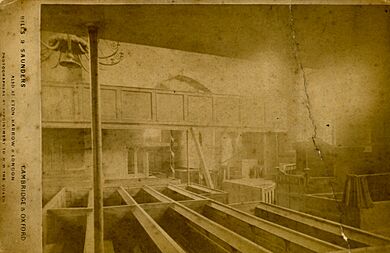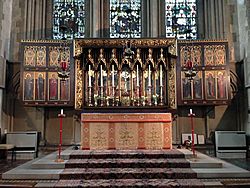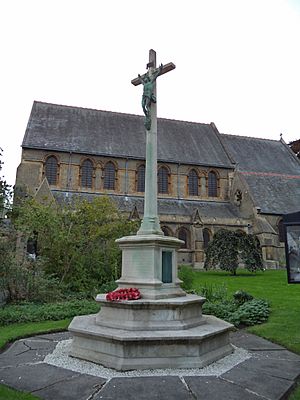St Giles' Church, Cambridge facts for kids
Quick facts for kids St Giles' Church |
|
|---|---|
| The Church of St Giles with St Peter | |
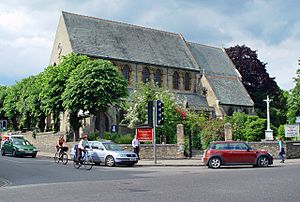
The Church of St Giles, Cambridge
|
|
| Location | Castle Street, Cambridge CB3 0AQ |
| Country | United Kingdom |
| Denomination | Church of England |
| History | |
| Consecrated | 1092 |
| Architecture | |
| Heritage designation | Grade II* listed |
| Style | Victorian Gothic |
| Years built | 1875 |
| Administration | |
| Diocese | Ely |
The Church of St Giles is a very old and important church in Cambridge, England. It belongs to the Church of England and is located where Castle Street and Chesterton Road meet. The church building you see today was finished in 1875. It replaced an even older church that was first built way back in 1092!
This church is also known as "St Giles with St Peter" because a nearby church, St Peter's Church, is no longer used for regular services. St Giles' Church is home to both an Anglican and a Romanian Orthodox group. It's also a popular place for concerts and other events. You can visit the church every day.
Outside the church, there is a special war memorial. It was designed by Bodley and Hare and was first shown to the public in 1920. This memorial is also a protected historic site.
Contents
History of St Giles' Church
How the Church Started
St Giles' Church began in 1092. A woman named Hugolina de Gernon, who was married to Picot of Cambridge, helped start it. Picot was an important person in the area, like a sheriff.
The story goes that Hugolina was very sick. She prayed to Saint Giles and promised to build a church for him if she got better. She did recover, so she kept her promise! Picot then helped set up the church. He talked to important church leaders like Archbishop Anselm and Bishop Remigius de Fécamp. The church was built near Picot's home at Cambridge Castle.
Some historians, like Alison Taylor, think that Picot might not have started a brand new church. Instead, he might have given control of an older church in the area to a group of priests called Canons Regular. This might have been done for money reasons.
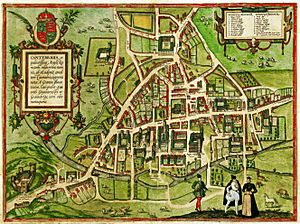
At first, six Augustinian canons (a type of priest) served at St Giles'. They stayed for about 20 years. After Picot died, they moved to Chesterton and started a new place called Barnwell Priory. St Giles' Church continued to operate, but it didn't grow much. This was because it was outside the town walls in a poor area that was badly affected by the Black Death (a terrible disease) in the past.
In 1562, during the time of Queen Elizabeth I, the Bishop of Ely was given control over the church. The church started keeping records of baptisms in 1596, and records of marriages and burials in 1607. They also began keeping track of the church's money in 1620.
| St. Giles Cambridge Inclosure Act 1802 | |
|---|---|
| Act of Parliament | |

|
|
| Long title | An Act for dividing, allotting, laying in Severalty, and inclosing, the Open and Common Fields, Common Meadows, and other Open and Commonable Lands and Waste Grounds, within the Parish of Saint Giles, in the Town of Cambridge in the County of Cambridge. |
| Citation | 42 Geo. 3. c. 108 Pr. |
For a long time, much of the land around St Giles' Church was open and shared. But in the early 1800s, a law called the St. Giles Cambridge Inclosure Act 1802 changed this. It divided up the land. The Vicar of St Giles received 33 acres, and the Bishop of Ely received 165 acres. More than half of the land went to the colleges in Cambridge.
Building the New Church
The original medieval church building changed a lot over time. Many parts were covered up or taken down. In the early 1800s, the vicar, William Farish, made the church much bigger. It could then hold 600 people instead of just 100.
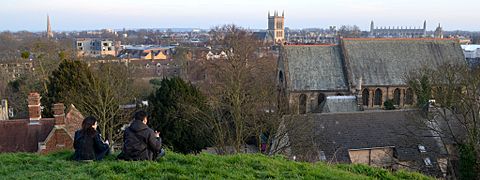
The old church served a growing community near the Cambridge Castle. Because the community was growing, a new church building was planned. This new Victorian building was designed by architects T. H. and F. Healey. It was built a little north of the old one.
Some parts from the old church were carefully moved into the new one. For example, a beautiful arch from the early 1100s was placed between the south aisle and the south chapel. A doorway from the late 1100s was moved to connect the north aisle and the vestry. A stone monument from the early 1600s, remembering Nicholas Carr, was also placed in the new church.
Inside the Church Today
The church is built with brick and has a roof made of special slate. Inside, at the High Altar, you can see the original artwork behind the current triptych (a three-part painting). This artwork shows Jesus appearing to his followers by the Sea of Galilee after his resurrection. The triptych was added around the year 1900.
Historic England, which lists important buildings, says St Giles' is "outstanding." This is because it has many old parts from the medieval times and the 1700s. It also has beautiful decorations from the 1800s made by famous church artists. The inside of the church was decorated in a style popular during the Oxford Movement. Sir Charles Kempe and Sir Ninian Comper designed much of the artwork.
The church also has copies of famous paintings, including one after Michelangelo and a copy of Paolo Veronese's "Adoration of the Magi" from Chatsworth House. Many of the wood carvings were made in the late 1800s by wood-carvers from Germany. The altar rails, which are very old (from the early 1700s), came from the English Church in Rotterdam.
The church has eighteen stained glass windows in the main part of the church. They were made by Robert Turnhill. These windows tell a story in order, starting with Saint Clement of Rome and others on the south side (added in 1888). They end with Samuel Seabury and others on the north side (added later).
Working Together
Today, St Giles' Church is part of a "team ministry." This means it works closely with other churches in the area. These include St Peter's, St Luke the Evangelist, and St Augustine's.
See also
 | Sharif Bey |
 | Hale Woodruff |
 | Richmond Barthé |
 | Purvis Young |


